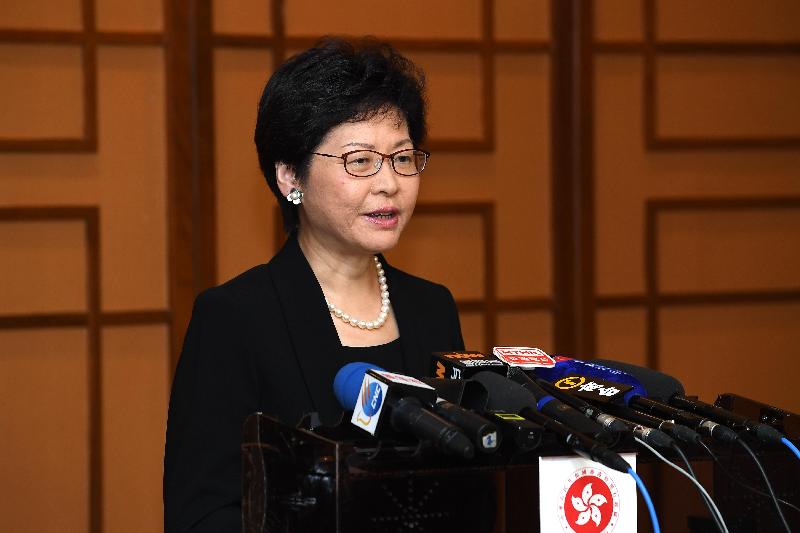Transcript of remarks by CE at a media session in Bangkok (with photo/video)
****************************************************************************
Chief Executive: I'll say a few words in English first. I have a very full day programme in Bangkok today, and I'm now coming here to meet with DPM (Deputy Prime Minister) Dr Somkid (Jatusripitak) and to attend a dinner which he is kindly hosting for me. I went to the Grand Palace to pay respects to the late King, and I want to take this opportunity to convey on behalf of the Hong Kong Special Administrative Region Government our deepest condolences to the people of Thailand. The late King, of course, is very well respected by the people of Thailand, and also very well respected throughout the world for his very visionary and compassionate leadership. To me, it's a personal honour to have this opportunity to pay respects to the late King of Thailand.
And then I had a very fruitful discussion with the Prime Minister. We talked about a wide range of issues, but basically it's really to enhance collaboration and partnership between Hong Kong and Thailand, especially in anticipation of the conclusion of a free trade agreement between Hong Kong and ASEAN.
Then I went to the Ministry of Foreign Affairs and attended a meeting not only with the Foreign Minister but also with three other ministers. I was told this was really exceptional and unprecedented for a visiting official to have an opportunity to attend a meeting and discuss a range of subjects with four ministers of the Thai Government. So I'm extremely grateful.
In the afternoon, I had two very useful sessions with Thai enterprises. The first session is with Thai enterprises operating in a range of sectors, from banking to beverage and other services, especially to talk about the respective roles of Hong Kong as a gateway to Mainland and Thailand as a gateway to the Cambodia, Laos, Myanmar, Vietnam region. The second session was really at my request because I'm very passionate about promoting Hong Kong's creative industries, so it was a session with Thai companies specialising in creative industries. And I am very impressed by the work done here, both in terms of robotics and content, entertainment and so on.
So it has been a very fruitful programme, and I will certainly follow up on the things that I have discussed with the Prime Minister and hopefully we will see a closer relationship between Hong Kong and Thailand. Thank you very much.
Reporter: Mrs Lam, so are you overruling the conclusion made by the working group on the long-term fiscal planning and would your progressive fiscal policy actually bring the structural deficit a step closer to us? And the second question is, Joseph Yam's remarks actually sparked some speculation that he is paving way for you to increase government spending. Some people suggest you are trying to sideline Financial Secretary Paul Chan. So is that so?
Chief Executive: Well, there is no truth in all those accusations. Mr Joseph Yam is a very, very experienced finance official and he's also sort of academic. He articulates fiscal policies and since he is now a member of the Executive Council and I welcome members of Executive Council including Mr Bernard Chan to express their views more freely in society so that society could have a more relevant debate on many of the issues that Hong Kong is facing. So there's absolutely no truth that this was a well-engineered way to pave the way for me to spend money or to sideline the Financial Secretary. We work as a team, both the Principal Officials as well as the members of the Executive Council.
As far as the long-term fiscal policy report, it’s not a question of overturning the conclusion of the report. But that report is a piece of work on projections, based on certain assumptions. And I'm just telling you that those assumptions could be changed with a change in policy. For example, if we are willing to spend more, to invest more, then there is a very good chance that Hong Kong's GDP growth will be a higher figure. And with a higher figure, then we probably will be able to collect more revenue. Similarly, if we are prepared to spend more on preventive care, on primary health care, on community and home-based care for the elderly, then we could reduce the rate of hospitalisation. So the assumption that we will need to double or triple hospital expenditure for caring on elderly may not be true. So it’s just a question of taking a policy view on some of these important issues.
(Please also refer to the Chinese portion of the transcript.)
Ends/Friday, August 4, 2017
Issued at HKT 23:12
Issued at HKT 23:12
NNNN





